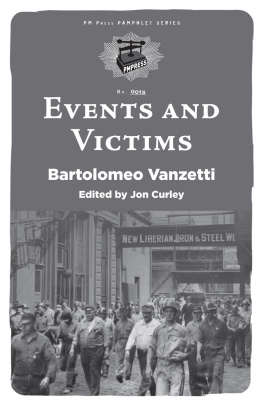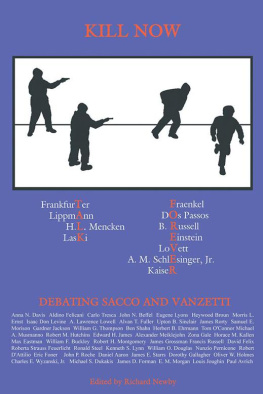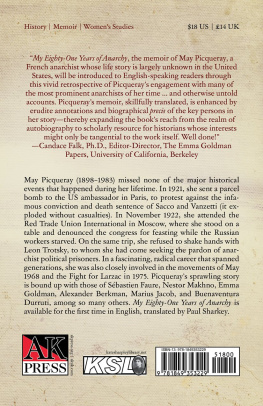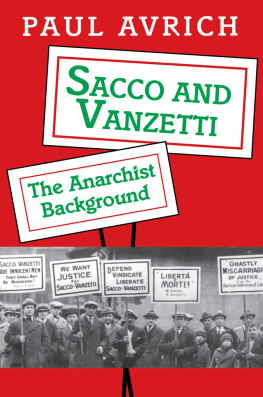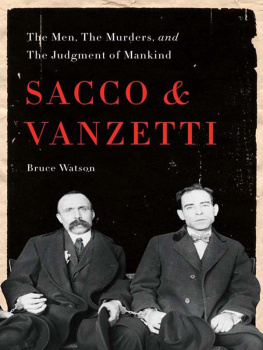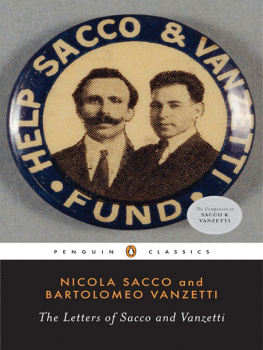PM P RESS PAMPHLET SERIES
0001: | BECOMING THE MEDIA: A CRITICAL HISTORY OF CLAMOR MAGAZINE |
By Jen Angel |
0002: | DARING TO STRUGGLE, FAILING TO WIN: THE RED ARMY FACTIONS 1977 CAMPAIGN OF DESPERATION |
By J. Smith and Andr Moncourt |
0003: | MOVE INTO THE LIGHT: POSTSCRIPT TO A TURBULENT 2007 |
By the Turbulence Collective |
0004: | THE PRISON-INDUSTRIAL COMPLEX AND THE GLOBAL ECONOMY |
By Eve Goldberg and Linda Evans |
0005: | ABOLISH RESTAURANTS: A WORKERS CRITIQUE OF THE FOOD SERVICE INDUSTRY |
By Prole |
0006: | SING FOR YOUR SUPPER: A DIY GUIDE TO PLAYING MUSIC, WRITING SONGS, AND BOOKING YOUR OWN GIGS |
By David Rovics |
0007: | PRISON ROUND TRIP |
By Klaus Viehmann |
0008: | SELF-DEFENSE FOR RADICALS: A TO Z GUIDE FOR SUBVERSIVE STRUGGLE |
By Mickey Z. |
0009: | SOLIDARITY UNIONISM AT STARBUCKS |
By Staughton Lynd and Daniel Gross |
0010: | COINTELSHOW: A PATRIOT ACT |
By L.M. Bogad |
0011: | ORGANIZING COOLS THE PLANET: TOOLS AND REFLECTIONS TO NAVIGATE THE CLIMATE CRISIS |
By Hilary Moore and Joshua Kahn Russell |
0012: | VENCEREMOS: VCTOR JARA AND THE NEW CHILEAN SONG MOVEMENT |
By Gabriel San Romn |
0013: | ON COMMUNITY CIVIL DISOBEDIENCE IN THE NAME OF SUSTAINABILITY: THE COMMUNITY RIGHTS MOVEMENT IN THE UNITED STATES |
By the Community Environmental Legal Defense Fund with an introduction by Thomas Linzey |
0014: | THAT PRECIOUS STRAND OF JEWISHNESS THAT CHALLENGES AUTHORITY |
By Leon Rosselson |
0015: | DIVIDE AND CONQUER OR DIVIDE AND SUBDIVIDE? HOW NOT TO REFIGHT THE FIRST INTERNATIONAL |
By Mark Leier |
0016: | HEART X-RAYS: A MODERN EPIC POEM |
By Marcus Colasurdo and G.H. Mosson |
0017: | THE YOUNG C.L.R. JAMES: A GRAPHIC NOVELETTE |
By Milton Knight Edited by Paul Buhle and Lawrence Ware |
0018: | EVENTS AND VICTIMS |
By Bartolomeo Vanzetti Edited by Jon Curley |
PM Press Pamphlet Series No. 0018
Events and Victims
Bartolomeo Vanzetti Edited by Jon Curley
ISBN: 978-1-62963-517-0
Copyright 2018
This edition copyright PM Press. All rights reserved
PM Press
PO Box 23912
Oakland, CA 94623
www.pmpress.org
For Bartolomeo Vanzetti: This project is yours. Late recognition of your literary as well as political vision, which I regard as meager but necessary justice. My gratitude to you for your words and life. I am honored to help bring this work, finally, into the world.
In memory of Grey Space (July 2, 1970December 4, 2016): friend, anarchist, queer street activist poet
only we can see
love when others make nazi
long live anarchy!
Acknowledgments
Special thanks to Ramsey Kanaan and the whole PM Press staff for their enthusiasm, engagement, and all around helpfulness. My deep appreciation goes to Gregory Nipper and Michael Ryan in particular for their supreme editorial advice and efforts on this project.
I am indebted to many people, those both familiar and exemplary, even some distant stars of illumination beyond the timeline of this work or my own. Let me provide a few names to herald as helpers and healers, shapers, and sharers, of this work and of my thinking about the world in which it exists, past and present: Tom Curley, Hedieh Allameh, Elena Alexander, Gypsy James OToole, Michael Heller, Kevin Bradbury, Jane Augustine, Chris Leo, Ariana Curley, Nick Heller, Bobby Lesko, Pam Lamora, Maryam Bahrainian, Pam Rehm, Fanny Howe, Burt Kimmelman, Eric Katz, John Laffey, Eamonn Vitt, the Curleys, the Beauchamps of Braintree, MA, and the illustrious cavalcade of anarchists, socialists, fellow travelers, aligned and non-, revolutionaries and resisters, freethinkers, those for whom a new world is conceivable and for whom the fight is worth taking into the streets and into print. Again and always, ultimate acknowledgment goes to the author, Bartolomeo Vanzetti:
Our WorkOur LivesOur Pains Nothing! The Taking of Our Lives, Lives of a Good Shoemaker and a Poor Fish PeddlerAll! That Last Moment Belongs to UsThat Agony Is Our Triumph!
Introduction
Bartolomeo Vanzetti:
Radical, Prisoner, Prison Writer
Who can know the incognitos of the future near and remote? From a letter of Bartolomeo Vanzetti to Elizabeth Glendower Evans, May 14, 1926
T HE CONTROVERSIAL CASE OF N ICOLA S ACCO AND B ARTOLOMEO V ANZETTI , their trial, execution, and legacy, are all well knownnotorious is the wordresonating even in the present day. More than ninety years ago, two Italian immigrants with anarchist politics were arrested, jailed, and executed for a crime for which evidence was circumstantial at best, doctored at worst, and for which a third party had confessed, testifying that neither individual was involved.
Bartolomeo Vanzettis courtroom eloquence during his legal trials is well known, and his prison letters are properly acclaimed for offering a constellation of insights about the U.S. prison system, the status of being an immigrant and radical, and the arduous process of becoming educated while incarcerated. Less knownbecause until now the story had never been publishedis that while in prison Vanzetti turned to writing fiction and learning English, completing one short story, Events and Victims, a blistering condemnation of the intractable economic exploitation of ceaselessly predatory capitalism from an anarchist aesthetic perspective. In this introduction, I wish to address both some of the incognitos of Vanzettis personal and artistic experience and the circumstances surrounding the composition of the story.
Some years ago, while reading the 1997 Penguin edition of The Letters of Sacco and Vanzetti, I came across a passing reference to a story by Vanzetti, Events and Victims, and was immediately intrigued. What kind of prisoner undertakes writing, particularly fiction, in a language only recently and partly acquired, under psychological duress, and with the very likely prospect of execution? I discovered that two different manuscript versions of Events and Victims existed in the Upton Sinclair papers at the Lilly Library at Indiana University. After reading each version, it occurred to me that Vanzettis story in some strategically but modestly edited form should be accessible to a wider audience than his prison cells, his tutor in English who edited and advised him on the short story, and the lonely archives of a Midwestern library.
Over the twentieth century, political prisoner writers of all stripes and striations have expressed their visions behind bars, and their words have slipped through those bars, escaping into the freer world, largely to an audience for whom their past experiences and present conditions are unfamiliar. Some of the most remarkable examples include the following: Alexander Berkmans

